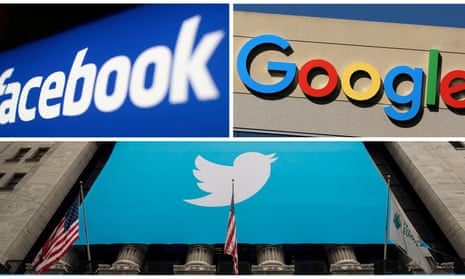Between the December 2019 elections in the United Kingdom and the November 2020 elections in the United States, the major global tech platforms will probably scramble to neutralize calls for their regulation or dismemberment.
Under the oxymoronic rubric of “self-regulation”, Facebook, Twitter and Google are already considering ways to appear responsible and protective of the integrity of those two elections. Twitter has pledged to stop running political ads, and both Google and Facebook are considering suspending precise targeting of political ads.
In 2016 Facebook played pivotal roles in the election of Rodrigo Duterte in the Philippines, the Brexit referendum and the electoral college victory of Donald Trump in the United States.
The shocks of 2016 awakened journalists and regulators to the ways that social media undermines democracy. After a decade of shallow proclamations of their democratic potential, it’s clear that Facebook, Twitter and Google are, in fact, major threats to democracy.
First, their targeted advertising services sever any sense of democratic accountability from the campaigns and parties that deploy them. Ads only reach the eyes for which they are intended – and thus never face scrutiny or response from opponents, critics or journalists.
Second, their algorithms amplify divisive, emotionally triggering content that can distract or disgust voters and undermine trust in democratic politics, institutions and ethnic or religious minorities.
And third, Facebook, Twitter and Google are designed to motivate people to do things like shop or vote. They undermine efforts to deliberate or think deeply about problems. Democracies need both motivation and deliberation.
The fate of Trump – lifted into office in 2016 in part by the power of Facebook to motivate and organize his core white nationalist supporters – preoccupies both critics and champions of Facebook, Twitter and Google.
But more than 60 countries will hold elections in 2020. Facebook and Google will be important variables in almost all of them. The first of these elections will be in January in Taiwan, where more than 89% of adults use Facebook regularly – a much higher percentage than almost any other country. With an eye on the unrest in Hong Kong and the mainland government’s brutality toward Muslim groups in western China, tensions will be high. Expect agents of the People’s Republic of China to flood Facebook with propaganda.
Other 2020 elections where Facebook and Google are likely to play a role include those in Poland, Greece, Moldova and France. The French senate elections are likely to be flooded by propaganda from ethno-nationalist forces domestically and anti-European Union efforts from outside. Parliamentary elections in Serbia, Lithuania, Georgia, Peru and Venezuela are also sure to be fraught.
But developed countries like France and the US should be able to take care of themselves. Their public spheres are robust and diverse. Citizens of both countries have many sources of information and many ways to communicate with each other. Despite seeing its two major postwar parties crumble in recent years, voters in France have managed to keep proto-fascists out of power in most of the country. And Trump’s unpopularity is firm, widespread and could grow as impeachment efforts progress.
Instead, we should attend to the places where citizens have little but Facebook through which to view their countries, governments and the world.
Myanmar and Sri Lanka will both hold parliamentary elections in 2020. Both countries also have Buddhist majorities that have grown violent and defensive in recent years. Sri Lanka only recently emerged from a decade of civil war against its Tamil, mostly Hindu, minority. In Myanmar, nationalists use Facebook to stoke hostility toward a minority Muslim ethnic group, the Rohingya.
Despite years of pleas and warnings by human rights groups, Facebook has failed to make any major changes to how it operates in Sri Lanka or Myanmar.
In an effort to head off serious regulatory scrutiny in Europe and North America, the big three – Facebook, Twitter and Google – have all lately taken to proposing various internal reforms. Yet their efforts have been focused on the experiences of Europeans and North Americans.
Don’t judge their efforts by how things go for Donald Trump in 2020. Look to Taiwan, Sri Lanka and Myanmar.
Siva Vaidhyanathan is a professor of media studies at the University of Virginia and the author of Antisocial Media: How Facebook Disconnects Us and Undermines Democracy
